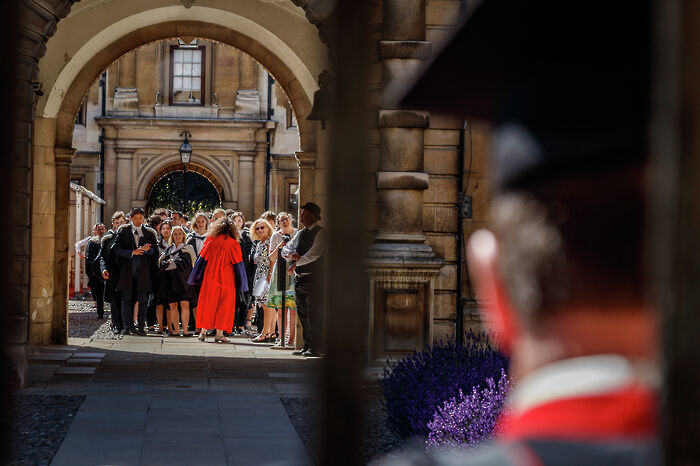Students raise slavery inquiry concerns at first advisory group open meeting
Professor Martin Millett, chairing the discussion, said that he was optimistic more colleges would agree to joining the inquiry

Around 25 people gathered on Tuesday in the Hopkinson Lecture Theatre for the first student open meeting of the advisory group to the University’s inquiry into its historic links to the slave trade.
Chaired by head of the advisory group Professor Martin Millett, the meeting centred around questions of college involvement in the inquiry, student consultation, and the process of “publicly acknowledging” the inquiry’s findings. Students also scrutinised the two-year time frame of the inquiry.
Concerns regarding the absence of college involvement in the inquiry dominated the meeting, particularly that college archives would be inaccessible to the researchers. The inquiry is set to focus on central University bodies, such as its faculties and departments, and does not include examining the possible ties of the University’s 31 constituent colleges to the slave trade.
Just a day after the inquiry was announced this April, an open letter demanding college involvement in the inquiry, among a host of other recommendations, was published by a working group within the University.
Addressing the room prior to opening up the discussion, Professor Millett admitted that there was no way in which college participation could be guaranteed. However, he was optimistic that more colleges would agree to joining the inquiry, considering two colleges, Trinity and Jesus, had already confirmed their participation while he claimed that there were many other “indications that colleges will respond”.
A spokesperson for Jesus told Varsity that they “welcome” the University’s inquiry, and “senior College officers have been in contact with both the Vice Chancellor and University’s Advisory Group Chair to offer full support, including opening the College archives to researchers”.
Trinity has been contacted for comment.
Jake Richards, who authored the open letter calling on colleges to commit to the investigation, argued that without guaranteed college cooperation, "criticism of the inquiry as a PR stunt is likely to recur".
Many other students voiced concerns regarding what they perceived to be a lack of formal consultation between the student body and the advisory group. Millett clarified that although specific groups have not been consulted, the advisory group exists as a way of gathering information and opinions from students.
The eight-member advisory group, commissioned by Vice-Chancellor Stephen Toope, comprises six academics from the University, a student representative from Cambridge’s Afro-Carribbean Society (ACS), and a member of the University Library’s senior leadership team. It will appoint the post-doctoral research students, oversee the inquiry and, following the inquiry, publish recommendations for further action and reform.
Richards argued that reparative justice was not yet explicitly within the inquiry's remit. He added that without it being within the remit, it would be hard to see how any justice initiative might last beyond the two-year reporting window for the inquiry.
At many points there was criticism of the “vague” language used by the advisory body, particularly in regards to student consultation and college participation. Many felt that the structures of the inquiry were not clear enough and the lines of communication too poorly defined. Others recognised that the inquiry was in its earliest stages and so these problems would be addressed in time.
Worries were raised about the “nebulous timeline” of the investigation. Millett’s hope was that the researchers would be in a position to start working before the end of the year. There would then be an interim report in Easter next year before the final report 2 years after the researchers started.
The Legacies of Slavery Inquiry was announced this April, and will see two post-doctoral research students expressly appointed to conduct research into how the University might have profited from, legitimised or challenged the Atlantic slave trade through examination of its material and intellectual histories. Any findings are expected to be publicly acknowledged in autumn 2021.
 News / Uni Scout and Guide Club affirms trans inclusion 12 December 2025
News / Uni Scout and Guide Club affirms trans inclusion 12 December 2025 News / Cambridge Vet School gets lifeline year to stay accredited28 November 2025
News / Cambridge Vet School gets lifeline year to stay accredited28 November 2025 News / Cambridge study finds students learn better with notes than AI13 December 2025
News / Cambridge study finds students learn better with notes than AI13 December 2025 Science / Did your ex trip on King’s Parade? The science behind the ‘ick’12 December 2025
Science / Did your ex trip on King’s Parade? The science behind the ‘ick’12 December 2025 News / Pembroke to convert listed office building into accom9 December 2025
News / Pembroke to convert listed office building into accom9 December 2025








